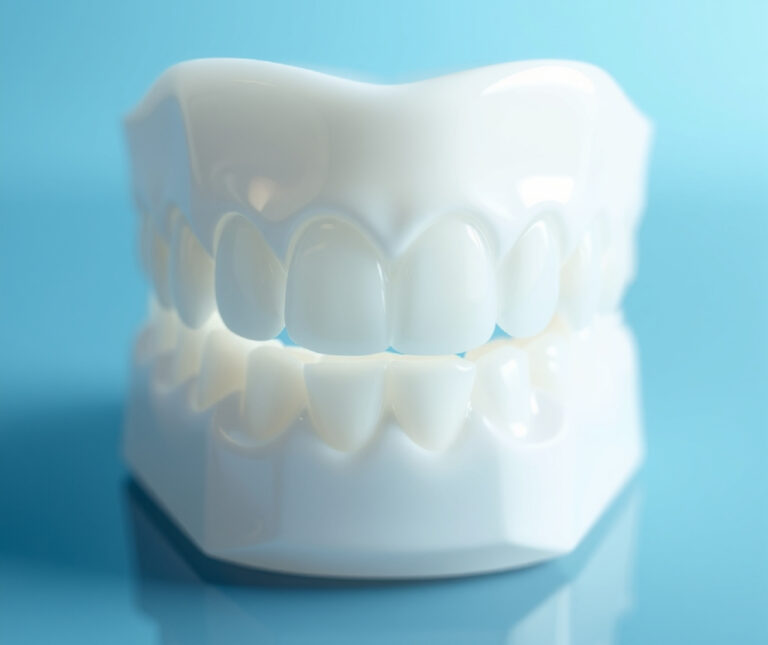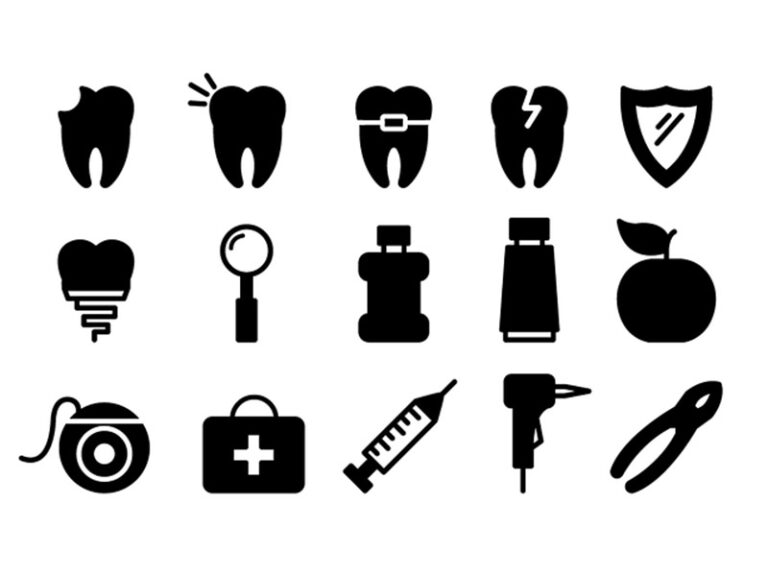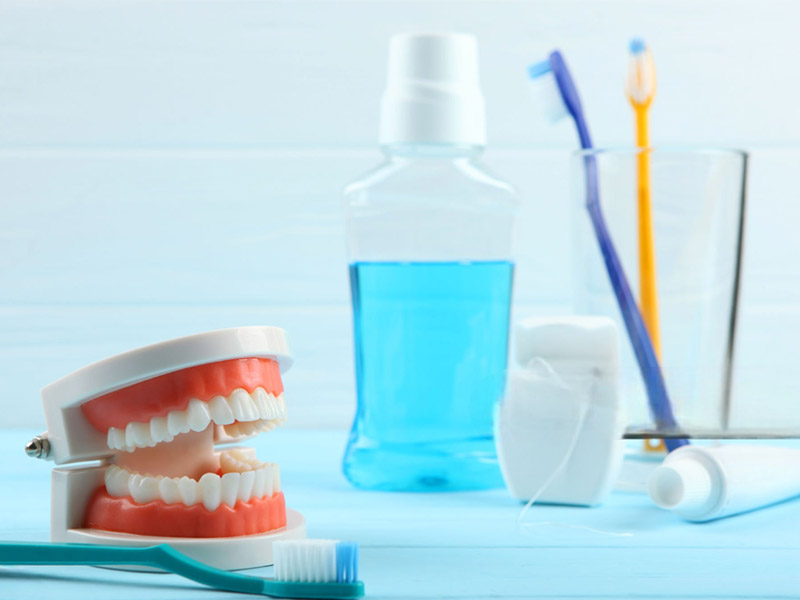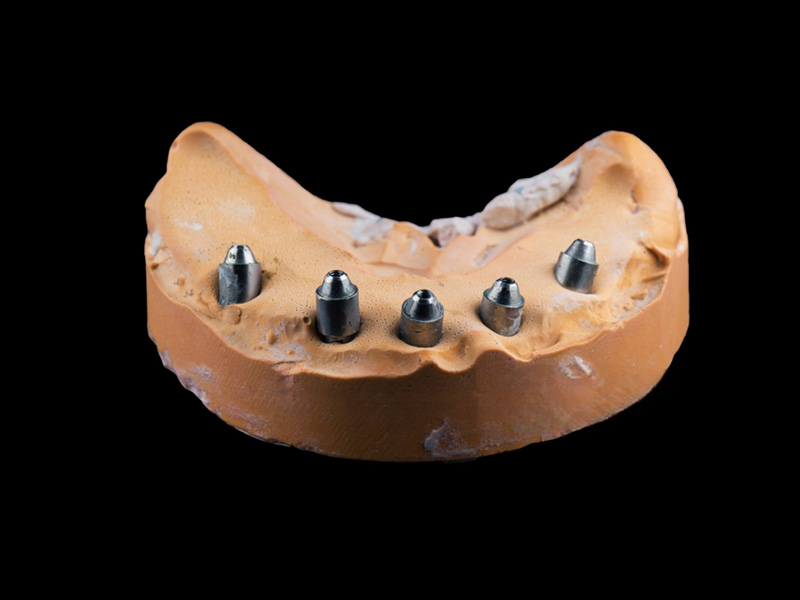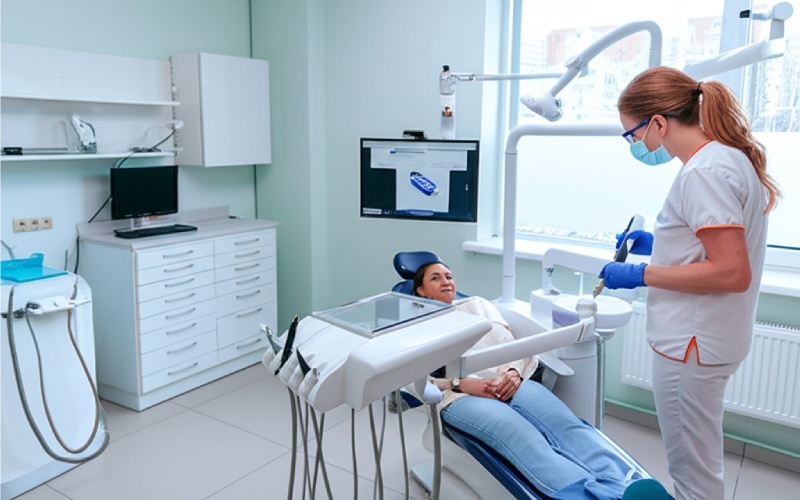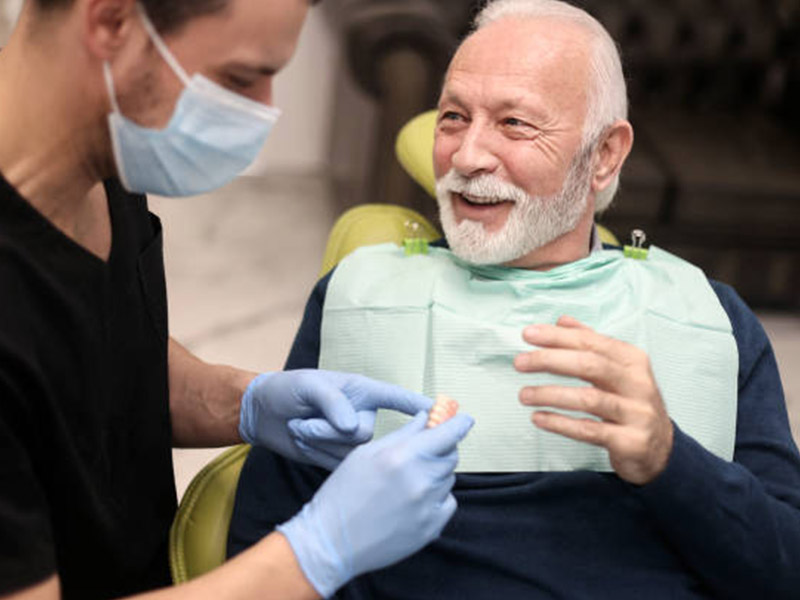
Complete Guide to Dentures for Seniors
If you’re thinking about getting dentures for yourself or someone you care about in USA, you’re probably feeling a lot of things at once. Worry, hope, maybe even fear. I’ve helped plenty of people—patients, friends, family—through this process. What I’m sharing here comes from real-life experience. Getting dentures is a big deal, but with good info, some understanding, and the right help, it can really change your life for the better.
Table of Contents
Why Seniors Have Unique Dental Needs for Dentures
From what I’ve seen here in Maryland, dentures aren’t just some “fake teeth.” They help you eat, talk, and feel like yourself again. But getting older brings its own set of problems.
Changes in Jawbone and Gums
The first time I saw an X-ray of my jaw after losing a couple of teeth, I couldn’t believe it. Most people don’t know that when you lose teeth, the bone in your jaw starts to shrink. Dentists call this bone loss, but it just means your jaw isn’t staying the same. Your gums get softer and more delicate too. So dentures for older folks have to be made extra carefully, since your mouth can keep changing even after you get your dentures.
I’ve seen people fight with loose dentures because their jawbone shrank more than they knew. That’s why, in Maryland clinics that work with seniors, the dental staff spends extra time looking at these changes. They know your fit today won’t last forever.
Health Problems You May Have Already
If you’re like most older folks, you’ve got some other health stuff going on. My own family has dealt with diabetes and weak bones, and both change your mouth health. Diabetes makes healing slower after getting teeth pulled. Osteoporosis weakens your jaw, so regular dentures can be really hard to fit.
And most older people I know take medicine for blood pressure, allergies, or mood. All these pills dry out your mouth. When you don’t have enough spit, dentures can rub, leave sore spots, and make eating no fun. So the best Maryland dentists for seniors always ask about your health, your meds, everything—not just how many teeth you’re missing.
The Need for a Dentist or Specialist Who Understands Seniors
You wouldn’t pick just anyone for heart surgery, right? Getting dentures that work well is the same—experience really matters. A friend of mine first saw a regular dentist for his dentures. He ended up with pain and a bad fit. Then he switched to a specialist—a prosthodontist, a dentist who trained extra years to handle new teeth. It made a huge difference. These pros know all the small details that make dentures work, even when your gums or bite are tricky.
Here in Maryland, we have great specialists and dental teams who even visit patients at home or work with care homes. Don’t settle for anything less.
Types of Dentures for Seniors
Now, let’s get real. Not all dentures are the same, and your best choice depends on your mouth, what you want, and your budget. Here’s how I break it down when my friends ask.
Full Regular Dentures
If you lost all your teeth on top or bottom, these are probably what you picture. My cousin went years fighting with broken-down teeth, then finally got full dentures. In Maryland, the dentist waits until your gums heal after pulling teeth (that takes a few weeks or months), then takes careful measurements to make sure your new teeth match you.
What’s good? These dentures are solid, proven, and can really bring back your smile. What’s bad? After some time, if your jawbone shrinks, they can get loose or feel like they’re floating. Always ask the dentist about ways to keep them steady if that worries you.
Partial Dentures
If you’ve still got some good teeth left, partials might be your answer. From what I’ve seen, partials help keep your other teeth in place and fill in the gaps. Dental labs in Maryland now make not just metal partials but also plastic ones that bend a little, like Valplast. These are lighter and almost disappear when you smile.
A neighbor of mine loved her bendy partial denture and said it “popped in and out easy” and felt more real than she expected. Ask your dentist which kind is right for you.
Dentures on Implants (Overdentures)
Now, this is where things get interesting. I’ve helped people who fought for years with bottom dentures that never stayed put—until they heard about implant-supported dentures. These use a couple of tiny metal rods (implants) in your jaw, and your denture snaps onto them. It’s a game-changer: they don’t move, are easy to clean, and you can eat an apple again without fear.
Maryland has a bunch of dentists—especially in Baltimore and Rockville—who are really good at this for seniors. Even people in their eighties can often get them if their health allows for small surgery. The big wins: strong biting, talking clearly, and less pain on your gums. Yes, up front they cost more, but believe me, the look on people’s faces says it’s worth it.
Immediate Dentures
No one wants to spend weeks or months with no teeth. I saw a friend really lose it at the idea. That’s why dentists use immediate dentures. They make them before pulling your teeth, so you never leave the office toothless—even if it’s just a temp.
One warning: as your gums heal, these dentures will get loose and need to be fixed or replaced. Think of them as training wheels for your real set.

The Denture Process: What to Expect at Our Maryland Office
Walking into a dental office and not knowing what’ll happen is scary—I get it. Here’s the step-by-step path I’ve walked with friends and family at Maryland clinics.
Step 1: First Visit and Checking Your Mouth
You get a friendly hello and go over your health stuff. Your dentist needs to know about your meds, any health problems, and what you want. They’ll take a good look in your mouth, maybe do some X-rays, and talk you through your choices.
Step 2: Molds and Measuring Your Jaw
This part is all about being exact. You bite into some soft stuff so they can see the shape of your mouth. Sometimes they’ll measure how your jaw moves to make sure your new teeth fit just right.
Step 3: Wax “Try-In” to Check the Fit and Look
Next comes what feels like a little sneak preview. You try on a model of your future dentures made in wax. The dentist checks the fit, your smile, even how your lips sit. If you don’t like how it looks, this is when you say so. It’s your smile!
Step 4: Getting Your Real Dentures and Making Changes
When the dentures are ready, you come in for the big fitting day. Your dentist makes all sorts of tiny fixes so your new teeth feel good. Don’t be embarrassed to say if something pokes or hurts—they expect to make changes.
Step 5: Follow-Up and Making It Fit Right
I always tell people: the day you get your dentures isn’t the end. Your mouth keeps changing, and you need check-ups. I know folks who went years without getting a re-fit and they were miserable—don’t let that be you. Go to your follow-ups.
Understanding the Cost of Dentures in Maryland
Money matters—a lot—when you’re on a tight budget or helping a parent or grandparent save. Here’s what I’ve learned while helping Maryland families count the cost.
Things That Change the Price
Denture prices aren’t just made up. Here’s what changes them:
- What They’re Made Of: Good plastic, metal, or new bendy stuff all cost different amounts—not just for comfort, but for how long they last and how they look.
- Type: Full dentures, partials, and ones that snap onto implants all come with different price tags.
- Extra Work: If you need teeth pulled, bone smoothed, or extra molds, that costs extra.
- Where You Live: Prices in Baltimore can be higher than out in the country—city offices pay more for rent.
I’ve seen regular dentures cost between $1,000 and $3,500 per row here in Maryland. Dentures on implants, including the surgery, can cost a lot more—sometimes $6,000 to $12,000 or higher. Always ask for a printed list of costs.
Does Medicare Pay for Dentures?
Here’s a spot where lots of people get mixed up. Regular Medicare (Part A and B) does not pay for dentures or most dental work. I learned this the hard way with my own parents.
One exception: some Medicare Advantage plans (Part C) have a little dental help. When you’re shopping for plans, look for this. But don’t be shocked if you find you’ll still have to pay a big part yourself.
Maryland Medicaid and Dental Help
If you’re on Maryland Medicaid (Medical Assistance), here’s some good news. You may now get help paying for dentures—this wasn’t always true. Ask to check your status. Usually, the office staff at the dental clinic can help with the forms.
Insurance & Ways to Pay
Maryland has lots of discount dental plans, private insurance, and ways to pay over time. Some clinics, especially those working with seniors, let you pay with CareCredit or let you pay a bit at a time.
Here’s a tip: Dental school clinics (like the University of Maryland’s in Baltimore) let student dentists work on you, watched by teachers. I know a lot of seniors who got great care here and paid less.
Taking Care of Your New Dentures for Success
Getting dentures is step one—keeping them comfy and working well is the next job. Here’s the routine I’ve seen work best for Maryland seniors.
Daily Cleaning (Brushing, Soaking)
My grandma always soaked hers every night in a fizzy cleaner. But that’s just part of it. I tell everyone: brush your dentures every day with a soft brush and gentle stuff—no scratchy toothpaste. That keeps germs and stains away—and avoids “denture breath,” which nobody wants.
Letting Your Gums Rest
Take your dentures out at night and let your mouth rest. I made the mistake of sleeping in mine early on. My gums got sore, and my dentist warned me about infections like thrush. Taking breaks keeps your mouth healthy.
Handle With Care
Dentures are tough, but if you drop them in the sink, they’ll break. Always fill the sink with water or put down a towel before you clean them. I learned this after seeing one too many broken sets.
Call Your Dentist for Fixes
Don’t just put up with pain, rubbing, or clicking. If it hurts, tell your dentist. Fixing the fit is normal. I’ve seen people live with pain for months, thinking “that’s just how it is getting older.” Nope—it doesn’t have to be.
FAQs: Your Denture Questions Answered
How long until dentures feel normal?
Give it at least a month. The first days are weird (sometimes a little sore, too). Start with soft foods, read aloud to get your speech back, and talk to your dentist if you get sore spots.
Will dentures mess up how I talk?
At first, yeah, a little. Some sounds come out funny. I practiced with tongue twisters and read the news out loud until my speech sounded normal again.
Can I eat all my favorite foods with dentures?
Mostly, yes—but it takes practice. Crunchy apples or chewy meat take time to get used to. Denture glue (like Polident or Fixodent) helps, but start with small bites. For me, I pretty much eat everything now—except I still watch out for jawbreakers or sticky caramel.
How often do I need new dentures?
Dentures last about 5–10 years. Your mouth changes shape, and they get worn down. I replace mine every 7 years or so, with lots of re-fittings. If they feel loose, break, or look old, don’t wait. New dentures can really make a difference.
Find Your Denture Specialist in Maryland
If this sounds like something you need, don’t wait. From Baltimore to Annapolis, Columbia to Frederick, Maryland has lots of experienced, kind dentists and specialists for seniors.
Want your smile and confidence back? Whether you want a house call, digital scans for dentures, or just a calm clinic, there’s a team ready for you. My advice? Go for a first meeting with no pressure. See how they treat you. Ask if they take your insurance or Medicaid. Ask for stories or pictures from patients like you.
You deserve dentures that look good and feel right. Don’t accept anything less.
Some Numbers Maryland Seniors Should Know
Here are a few stats to put things in perspective:
| Fact | Number | What It Means |
|---|---|---|
| Total Tooth Loss in Adults 65+ | 1 in 6 | You’re not alone; this happens to lots of people, and it’s normal. |
| Seniors With Dentures | About 90% (of those who lost all teeth) | Most people like you get dentures. You’re not the only one. |
| Too Few Teeth Means More Trouble Eating | Less than 20 teeth = higher risk | Dentures help you eat better and stay healthy. |
| Happy With Dentures on Implants | Much happier than with regular lower dentures | If current lower dentures are annoying, think about implants. |
| Dentures Usually Last | 5–10 years | Visit your dentist for check-ups and don’t wait for problems. |
| Most Seniors’ Insurance Doesn’t Cover Dentures | Less than half have coverage | Be ready to pay some yourself. Look for help if you need it. |
Last Thoughts
Getting dentures isn’t just about missing teeth. It’s about eating what you love, laughing without worry, and feeling good around people. What I’ve seen in Maryland: the process goes smoother, and people are happier if you pick a dentist who really listens and works with seniors all the time.
Your smile is worth it. Have questions? Need help finding the right clinic or coverage? I’m here. You can do this, and you don’t have to do it alone.
Need more info, like popular keywords or a list of dental offices in your area? Just ask. I’ve got your back.


